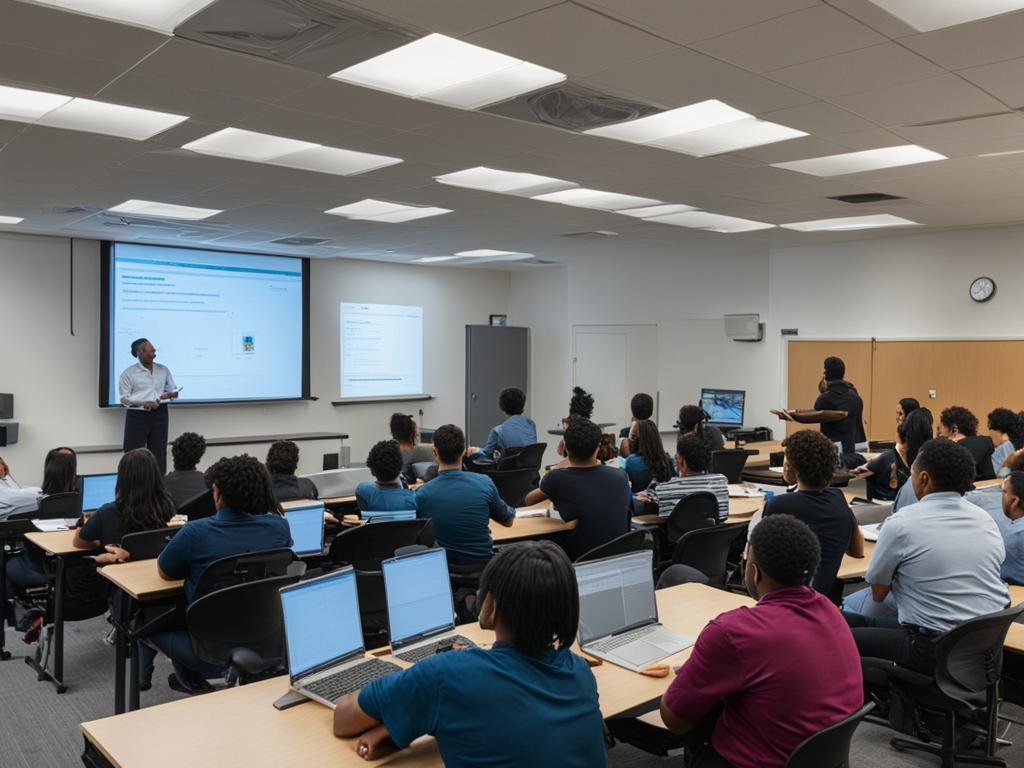Are you looking to enhance your technical skills and unlock your potential in the world of technology? Look no further. Our technical training courses are designed to provide you with the knowledge and certifications you need to excel in areas such as software development, engineering, and computer programming. From comprehensive workshops to hands-on training, we offer a wide range of programs tailored to suit your needs.
Key Takeaways:
- Our technical training courses offer in-depth training and certifications in various fields such as software development, engineering, and computer programming.
- We provide hands-on workshops and comprehensive training programs to enhance your technical skills.
- Our industry-recognized certifications can help you succeed in the ever-evolving technology field.
- Choose from a variety of technical training programs that cater to different learning styles and preferences.
- Investing in technical training can accelerate your career advancement and keep you competitive in the job market.
Why Invest in Technical Training and Development?
Investing in technical training and development is crucial for individuals looking to enhance their skills, advance their careers, and stay competitive in a rapidly changing job market. With professional development training and on-the-job training, individuals can accelerate their career advancement and qualify for promotions or new job opportunities.
Technical training also plays a vital role in skill enhancement, ensuring individuals stay up-to-date with the latest industry trends and advancements. By investing in their technical skills, individuals can become well-equipped to succeed in their roles and achieve their career goals.
In addition to providing the necessary technical expertise, technical training also helps individuals develop transferable skills such as communication, problem-solving, and teamwork. These soft skills are essential for workplace productivity and can further enhance career prospects.
The Benefits of Technical Training and Development:
- Enhances technical skills
- Accelerates career advancement
- Keeps individuals up-to-date with industry trends
- Develops transferable skills
- Increases job opportunities and promotions
- Boosts workplace productivity
Invest in technical training today to unlock your potential and achieve professional success!
Types of Technical Training Programs
When it comes to technical training, there are various programs available to cater to different learning styles and preferences. Whether you prefer online courses, on-the-job training, or hands-on workshops, there is a training program that suits your needs and goals.
Online technical courses provide flexibility and convenience, allowing individuals to learn at their own pace and from anywhere. These courses often offer comprehensive curriculum and assessments to ensure that you grasp the material effectively.
On-the-job training is another popular option, where you learn by completing specific tasks and projects within your work environment. This type of training provides hands-on experience and allows you to apply your skills directly to real-life situations.
Hands-on training workshops provide immersive learning experiences and practical skills development. These workshops often involve interactive exercises, group activities, and simulations to enhance your understanding of technical concepts.
| Types of Technical Training Programs | Description |
|---|---|
| Online Technical Courses | Flexible and convenient learning through online platforms |
| On-the-Job Training | Learning by completing specific tasks and projects in the workplace |
| Hands-On Training Workshops | Immersive learning experiences with interactive exercises and simulations |

Online Technical Courses
Online technical courses offer flexibility and convenience, allowing individuals to learn at their own pace and from anywhere. These courses provide a wide range of subjects and specializations, from software development to data analysis and cybersecurity. By enrolling in online courses, you can gain valuable technical skills and certifications that enhance your professional profile.
On-the-Job Training
On-the-job training is a practical and hands-on approach to learning technical skills. It involves working closely with experienced professionals in your field, who guide and mentor you through real-life projects and tasks. This type of training allows you to apply theoretical knowledge to practical situations, gaining valuable experience and developing a deeper understanding of your role.
Hands-On Training Workshops
Hands-on training workshops provide immersive learning experiences that focus on practical skills development. These workshops often involve interactive exercises, group activities, and simulations to enhance understanding and application of technical concepts. By participating in hands-on workshops, you can gain valuable practical skills that can be immediately applied in your work or personal projects.
Overall, the variety of technical training programs available ensures that individuals have access to the learning methods that best suit their needs. Whether you prefer the flexibility of online courses, the practicality of on-the-job training, or the immersive experience of hands-on workshops, there are options available to help you enhance your technical skills and excel in your chosen field.
The Importance of Technical Training for Employees
Technical training plays a vital role in the development and growth of employees within an organization. It equips them with the necessary skills and knowledge to excel in their roles, enhances their career prospects, and contributes to increased productivity and job satisfaction. Let’s explore why technical training is crucial for employees.
1. Employee Development and Career Growth
Technical training provides employees with opportunities for continuous learning and development. By acquiring new technical skills and knowledge, employees can expand their expertise, improve their job performance, and increase their value in the job market. This ultimately opens doors to career advancement and growth within the organization.
Table:
| Benefits of Technical Training for Employees | |
|---|---|
| Enhanced job performance | Increased job satisfaction |
| Career advancement opportunities | Improved marketability |
| Expanded skill set | Increased confidence |
| Adaptability to technological advancements | Ability to take on challenging projects |
2. Development of Soft Skills
While technical skills are essential, soft skills also play a crucial role in employee success. Technical training often includes components that focus on developing communication, teamwork, problem-solving, and leadership skills. These skills enable employees to collaborate effectively, adapt to different work situations, and contribute positively to the overall productivity of the organization.
3. Enhanced Productivity
Technical training equips employees with the latest tools, techniques, and best practices relevant to their roles. By staying updated with industry trends and advancements, employees can work more efficiently and effectively, resulting in improved productivity. This not only benefits the employees themselves but also positively impacts the overall performance of the organization.
As organizations continue to evolve and technology becomes increasingly integral to daily operations, the importance of technical training for employees cannot be overstated. It empowers individuals to thrive in their roles, fosters their professional development, and contributes to the success of the organization as a whole.

How to Choose an Effective Technical Training Program
Choosing the right technical training program is crucial for acquiring the skills and knowledge you need to succeed in your chosen field. With the wide range of options available, it’s important to consider several factors when making your decision.
1. Training Content: Evaluate the training content to ensure it aligns with your specific technical needs and goals. Look for programs that cover the relevant topics and provide comprehensive instruction on the skills you want to acquire.
2. Assessment: A good technical training program should include assessments to gauge your progress and identify areas for improvement. Assessments help you track your development and ensure that the program is effectively meeting your learning objectives.
3. Mentorship: Having access to a mentor or instructor can greatly enhance the learning experience. Look for programs that offer mentorship opportunities, allowing you to receive guidance and support from industry experts who can help you navigate challenges and provide valuable insights.
4. Curriculum: Review the curriculum to ensure it covers the latest industry trends and technologies. A comprehensive curriculum will keep you up-to-date with the ever-changing landscape and equip you with the skills needed to stay competitive in your field.
By considering these factors and conducting thorough research, you can choose an effective technical training program that aligns with your goals and sets you on the path to success.
| Factor | Considerations |
|---|---|
| Training Content | Evaluate if it aligns with your technical needs and goals |
| Assessment | Ensure the program includes assessments to gauge your progress |
| Mentorship | Look for programs that offer mentorship opportunities for guidance and support |
| Curriculum | Review the curriculum to ensure it covers the latest industry trends and technologies |
Benefits of Technical Training for Organizations
Technical training programs not only benefit individual employees but also have a significant positive impact on organizations as a whole. By investing in employee skills development, organizations can enhance productivity, increase workforce engagement, and stay competitive in today’s fast-paced business environment.
One of the key benefits of technical training for organizations is the improvement in employee skills and knowledge. When employees undergo comprehensive technical training programs, they acquire the necessary expertise to handle complex tasks and projects more effectively. This leads to increased productivity and efficiency, as employees are better equipped to perform their roles.
Furthermore, technical training promotes workforce engagement. When organizations prioritize employee development, it sends a message that employees are valued and supported in their professional growth. This not only boosts employee morale and job satisfaction but also encourages them to actively contribute to the organization’s success.
By investing in technical training, organizations also stay ahead of the competition. In today’s rapidly evolving business landscape, it is crucial to adapt to emerging technologies and industry trends. Technical training programs provide employees with up-to-date skills and knowledge, ensuring that organizations remain competitive and can effectively respond to changing market demands.
Table: Impact of Technical Training on Organizations
| Benefits | Description |
|---|---|
| Increased Productivity | Well-trained employees are more efficient and effective in their job roles, resulting in improved productivity. |
| Workforce Engagement | Investing in employee skills development fosters a sense of engagement and commitment among the workforce. |
| Improved Competitiveness | Organizations that prioritize technical training stay ahead of the competition by adapting to emerging technologies and industry trends. |

In conclusion, technical training programs play a vital role in the success of organizations. By investing in employee skills development, organizations can achieve increased productivity, foster workforce engagement, and maintain a competitive edge in the market. Technical training is a crucial investment that ensures the long-term growth and success of organizations in the ever-evolving business landscape.
The Role of Technical Training in Onboarding and Employee Success
Technical training plays a crucial role in onboarding new employees and setting them up for success. It provides job-specific training, equipping new hires with the skills and knowledge necessary to perform their role effectively. By investing in comprehensive onboarding programs that include technical training, organizations can ensure their new employees are better equipped to contribute to the success of the company.

One of the key benefits of technical training in onboarding is its focus on job-specific training. This type of training allows new employees to quickly understand their roles and responsibilities and develop the necessary skills to excel in their positions. By providing targeted technical training, organizations can reduce the learning curve for new hires and accelerate their integration into the company.
Furthermore, technical training in onboarding goes beyond just job-specific skills. It also focuses on developing transferable skills that can benefit employees in their current and future positions. These transferable skills, such as problem-solving, communication, and critical thinking, can be applied across different roles and departments within the organization. By equipping new employees with these transferable skills, organizations can build a versatile and adaptable workforce.
In addition to job-specific training and transferable skills, technical training in onboarding helps new employees feel supported and valued. It shows that the organization is invested in their success and growth, which can contribute to higher levels of employee engagement and satisfaction. When employees feel supported and confident in their abilities, they are more likely to be motivated and committed to their work, ultimately driving better results for the company.
The Impact of Technical Training on Employee Satisfaction and Retention
Technical training plays a crucial role in enhancing employee satisfaction and improving retention rates within organizations. By offering employees opportunities for professional development and skill advancement, organizations can create a positive work environment that fosters growth and job satisfaction. When employees feel valued and supported in their career development, they are more likely to stay with the company for the long term.
Investing in technical training demonstrates a commitment to employee growth and sends a message that the organization values its workforce. This can have a significant impact on employee satisfaction levels, as it shows employees that their professional development is a priority. Technical training programs provide employees with the tools and knowledge to excel in their roles, empowering them to take on new challenges and contribute to the success of the organization.
Moreover, technical training can directly impact career advancement opportunities for employees. By acquiring new skills and expanding their knowledge base, employees become more competitive in the job market and are better positioned for promotions and higher-level positions within the organization. This career advancement potential enhances job satisfaction and encourages employees to stay with the company for longer periods.
Table: The Benefits of Technical Training on Employee Satisfaction and Retention
| Benefits | Explanation |
|---|---|
| Enhanced job satisfaction | Technical training provides employees with the skills and knowledge to perform their roles effectively, leading to increased job satisfaction. |
| Increased career advancement opportunities | By acquiring new skills through technical training, employees can qualify for promotions and higher-level positions within the organization. |
| Improved employee engagement | Technical training demonstrates an organization’s commitment to employee growth, fostering a sense of engagement and loyalty among employees. |
| Higher retention rates | When employees feel valued and supported in their professional development, they are more likely to remain with the company for longer periods. |
In conclusion, technical training has a significant impact on employee satisfaction and retention within organizations. By investing in the professional development of employees and providing opportunities for skill enhancement, organizations can create a positive work environment that fosters growth, career advancement, and job satisfaction. Technical training programs not only benefit individual employees but also contribute to the overall success and competitiveness of the organization.
The Future of Technical Training
As emerging technologies continue to reshape industries and job roles, the future of technical training is more important than ever. Staying abreast of these developments and acquiring up-to-date skills is crucial for professionals looking to thrive in the ever-changing landscape. Technical training programs must adapt to the demands of the future workforce, offering training that aligns with industry trends and equips individuals with the necessary skills to excel.
One of the key aspects of the future of technical training is its focus on emerging technologies. As new innovations emerge, such as artificial intelligence, blockchain, and virtual reality, technical training programs need to incorporate these technologies into their curriculum. This ensures that individuals are equipped with the skills and knowledge needed to work with these cutting-edge tools and stay ahead of the curve.
Furthermore, technical training must address the evolving needs of industries and job roles. With the rapid pace of change, traditional training approaches may no longer suffice. The future of technical training lies in agile and adaptable programs that can quickly respond to industry shifts and provide individuals with the skills that are in-demand.
The future of technical training also involves a focus on industry trends. By analyzing market demands and identifying emerging trends, training programs can ensure their content is relevant and tailored to the needs of employers. This includes incorporating real-world case studies, practical exercises, and hands-on projects that simulate the challenges faced in the industry.
In summary, the future of technical training lies in its ability to adapt to emerging technologies, address evolving industry needs, and stay aligned with market trends. By doing so, individuals can acquire the up-to-date skills needed to succeed in their careers, while organizations can ensure their workforce remains competitive in a rapidly changing business landscape.
The Value of Technical Training Certificates and Exams
Technical training certificates and exams play a crucial role in the industry, offering recognition and validating professional credibility. These certifications are highly regarded by employers, showcasing an individual’s expertise and proficiency in a specific technical field. By obtaining a technical training certificate or successfully passing an exam, professionals gain a competitive edge and increase their chances of securing new job opportunities, promotions, and higher salaries.
Industry recognition is a significant advantage of technical training certificates and exams. Employers often prioritize candidates with industry-recognized certifications as they demonstrate a commitment to continuous learning and staying up-to-date with the latest industry standards. These certifications act as a powerful indicator of an individual’s dedication to their professional growth, making them more desirable to potential employers.
Moreover, technical training certificates and exams provide professionals with a tangible proof of their skills and knowledge. These certifications serve as verifiable credentials, giving employers confidence in the capabilities of the certified individuals. By earning a technical training certificate or passing an exam, professionals can showcase their expertise in a particular technical domain, further reinforcing their professional credibility.
Benefits of Technical Training Certificates and Exams:
- Enhanced employability: Technical training certificates and exams increase employability by demonstrating specialized skills and expertise.
- Career advancement opportunities: These certifications open doors to promotions and new job opportunities.
- Higher earning potential: Certified professionals often command higher salaries due to their validated skills and knowledge.
- Continuous professional development: Technical training certificates and exams encourage lifelong learning and the pursuit of new knowledge.
- Competitive advantage: These certifications differentiate professionals from the competition, making them stand out to employers.
In conclusion, technical training certificates and exams hold significant value in the industry. They provide recognition, validate professional credibility, and enhance employability. These certifications act as tangible proof of an individual’s skills and knowledge, making them more desirable to employers. By investing in technical training certificates and exams, professionals can unlock new opportunities, advance their careers, and stay ahead in the competitive job market.
Checklist to Create Effective Technical Training Programs
Creating effective technical training programs is essential for ensuring that employees and learners acquire the knowledge and skills they need to excel in their roles. To achieve this, you can follow a checklist to guide you through the process:
- Needs Assessment: Begin by identifying the specific technical skills and knowledge gaps within your organization. Understand the needs and goals of your learners to tailor the training program accordingly.
- Clear Objectives: Define clear and measurable learning objectives. These objectives should outline what participants will be able to do or know after completing the training.
- Content Development: Develop relevant and up-to-date training exist materials that align with the learning objectives. Ensure that the content is engaging and easy to understand.
- Delivery Methods: Select appropriate delivery methods, ticket which could include instructor-led training, e-learning modules, hands-on workshops, or a blend of these approaches. Consider the preferences and needs of your job colleague description audience.
- Assessment Tools: Create assessment tools, ticket such as quizzes, tests, or practical evaluations, to measure learners’ job description progress and understanding of the material.
Also Read : Unlock Creativity With Expert Technical Drawing Tips
Conclusion
Technical training is a crucial step towards achieving career growth and personal development. By investing in technical training, individuals can unlock their potential employees to learn and open doors to new opportunities. Whether you’re looking to acquire new skills, advance in your career, or stay ahead of industry trends, technical training also create provides the necessary tools and resources for success.
With the ever-changing job market, staying relevant and up-to-date with the latest technologies and skills is essential. Technical training equips individuals with the knowledge and expertise needed to thrive in their chosen field. It not only enhances your professional capabilities but also boosts your confidence, making you more valuable in the eyes of employers.
Embracing technical training is a commitment to lifelong learning and self-improvement. It is a proactive approach to personal and professional growth, ensuring that you are well-equipped to navigate the challenges and opportunities that come your way. So, take the first step on your path to a successful career by exploring the diverse range of technical training programs available today.
FAQ
Q: What technical skills do your training courses cover?
A: Our training courses cover a wide range of technical skills, including programming languages, software development, data analytics, cybersecurity, cloud computing, and more.
Q: How can your training courses help employees keep up with the latest technology advancements?
A: Our training courses are designed to equip employees with the essential skills needed to keep up with the latest technological developments across industries. This ensures that they’re well-prepared to implement and utilize new software and tools within the work environment.
Q: Can your training courses be customized to fit the specific needs of our company?
A: Yes, we understand that each company’s requirements may vary. We can create custom training programs based on the specific needs of your company, ensuring that your employees are equipped to succeed within your unique environment.
Q: Do you offer free demos of your training courses?
A: Yes, we offer free demos to give you and your team members a firsthand look at the content and format of our training programs. This allows you to assess the relevance and quality of the training before making a commitment.
Q: How do your training courses assist employees in developing hard skills?
A: Our training is designed to facilitate the learning of hard technical skills within the subject matter, providing step-by-step assistance to ensure employees are equipped with the necessary technical aspects to excel in their roles.
Q: Why is it important to note the technical skills offered in your training courses?
A: It’s important to note the technical skills offered in our training courses as these skills are crucial for employees’ professional development, making them more accessible to new job opportunities and quicker to adapt to evolving employment demands.
Q: Can our company’s employees benefit from your training courses in content marketing?
A: Yes, our training courses also cover content marketing, providing employees with the knowledge and skills to effectively implement content marketing strategies within your company’s overall marketing initiatives.
Q: How can your training courses help managers in facilitating the evolution process within their teams?
A: Our training courses equip managers with the skills and knowledge to assist their team members in learning new technical skills, allowing them to take the initiative in implementing and facilitating the adoption of new technologies within their teams.
Q: Do you offer technical training courses for specific software such as JavaScript?
A: Yes, we offer technical training courses that focus on specific software and tools, including JavaScript. These courses are designed to provide employees with the technical knowledge and expertise required to effectively utilize these tools within their roles.
Q: How do your technical training courses ensure the completion of the learning process?
A: Our training courses provide a comprehensive process for the completion of technical training, offering support and assistance to ensure that employees have mastered the necessary technical skills by the end of the program.
Source Links
- https://www.talentlms.com/library/unlocking-your-potential/
- https://perscholas.org/about-per-scholas/launch-your-tech-career/
- https://www.linkedin.com/pulse/unlock-your-potential-upcoming-training-development

